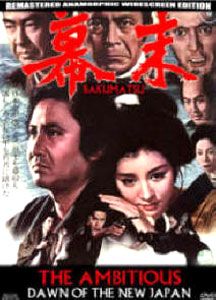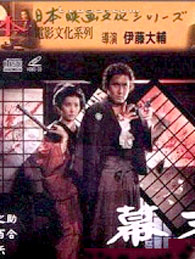 The final film written & directed by Daisuke Ito was Bakumatsu (The Ambitious, Nakamura, 1970) about the life of a Ryoma Sakamoto, a samurai at the end of the Tokugawa era (the Bakumatsu period) who had the audacity to imagine a classless society.
The final film written & directed by Daisuke Ito was Bakumatsu (The Ambitious, Nakamura, 1970) about the life of a Ryoma Sakamoto, a samurai at the end of the Tokugawa era (the Bakumatsu period) who had the audacity to imagine a classless society.
Ito was seventy-one at the time. He had been directing since the silent film era & was instrumental in the development of samurai cinema. But by the time he helmed Bakumatsu, he was barely ambulatory.
Further, the film's star Kinnosuke Nakamura was also the film's producer, & had too much power & authority over the whole project. So if Ito noticed a problem here & there with Kinnosuke's over-acting, he wasn't apt to tell the boss to rein it in.
Kinnosuke had felt such restraint when chained to Toei Studios, doing whatever film they said he must, on "product" budgets. He'd long been one of the biggest cashcow stars for Toei, & he may have felt truly liberated to be out of the contract & able to call his own shots.
But in 1970, Japanese cinema was beginning a decade-long economic decline. There would be fewer theatrical releases & many of the previous two decades' big stars were salvaging careers by migrating to television.
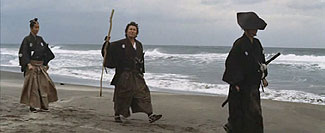 It wasn't ideal timing for Kinnosuke to start his own independent film company, though he was by no means the only one attempting it. It wasn't ideal timing for Kinnosuke to start his own independent film company, though he was by no means the only one attempting it.
Unbridled & not pinching pennies like a practiced producer would, he spared no expense in his desire to make Bakumatsu a major film both exciting & intelligent, with a major cast & a bit too long. Sadly it came off as something of vanity project.
Kinnosuke nearly bankrupted himself betting too much on one movie. He saved his company by turning to television productions with restrained budgets.
But a few years later he had further bad luck in lending financial support to his friend Shintaro Katsu, who had also founded his own production company. Katsushin had been profligate as a boozer & gambler with easy access to his own company's funds. Kinnosuke's helpfulness meant both companies would go down.
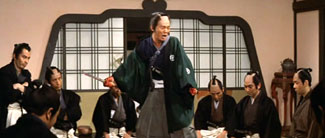 I missed Bakumatsu when it came out though I was seeing four or more Japanese movies a week at the time. I missed Bakumatsu when it came out though I was seeing four or more Japanese movies a week at the time.
I was long left to wonder if it were the great work of art Kinnosuke intended & its box office failure was due to factors other than quality.
When I did finally see it, I realized there was nothing about it that could induce the public to line up. It was fairly intelligent but it was also talkie & the convoluted storyline was dull, & no one's performance was especially grand.
Had it been just another jidai-geki without expectation, without so much riding on its success, it would've seemed a very decent minor film, rather than an overpriced would-be epic.
In pacing & style it does not feel like a film directed by Daisuke Ito, & certainly didn't feel like his script though it is. Throughout his career, early on & right into the 1960s, he managed again & again to come up with an action scene or two that was simply mindblowing. Not this time.
Rather, Ambitious has the feel of a movie version of a television mini series. The structure requires the introduction of major characters who are followed for ten or fifteen minutes before they are killed, then the introduction of different characters followed for ten or fifteen minutes until they are killed. It's hard to find a character who knits the episodes into a whole.
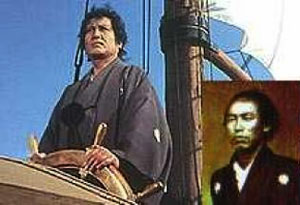 As the tale opens, a cruel drunken samurai, Nomito (Isao Yamagata), tortures & kills a harmless merchant of Chosu.
As the tale opens, a cruel drunken samurai, Nomito (Isao Yamagata), tortures & kills a harmless merchant of Chosu.
The drunkard then attacks a tinker who carries a single sword, forcing him to duel though he has no skill.
The tinker's brother Toranosuke (Akihiko Kataoka) is a spearman who manages to kill Nomito, but accidentally a monk as well. His act means a lot of trouble, so he elects to commit seppuku, & slits his belly with permission in the garden of Ryoma Sakamoto.
Ryoma & Shintaro Nakaoka (Tatsuya Nakadai) are part of a group of samurai agitating for change. Shintaro was friendly with the spearman & his tinker brother. He regrets that the world is as it is, but Ryoma's disaffection with feudal norms goes much deeper.
The film's moments of action are far & few between so it is the politicized & expository dialogue that most matters. Alas, Ito's script is not his best for dialogue. The convoluted plot is scarsely worth sorting out.
We're subjected to lots of talking, a bit of yelling, mostly about the politics of the era. When there are action scenes, this was always Ito's strong point & it's strongly done here even if lacking individuality. But unless one finds the loyalist vs royalist coffee-klatches scintillating, a lot of the film just seems to mark time.
On the one hand the film assumes all viewers know the whole history of Sakamoto Ryoma as well as several subsidiary figures among Royalists & Loyalists, so it sometimes leaves a western viewer out on a limb. On the other hand, characters sit or stand around doing nothing but chatter a lot of the time, in lengthy didactic conversations explaining the political context to each other, which manages still to need explaining if you haven't read much about the Bakumatsu period, while boring anyone who already knows the context for Ryoma's biography.
Ryoma was a samurai who envisioned a post-shogunate post-medieval world without class divisions, & envisioned Japan as a powerhouse in international trade. Japan was at the tail-end of 300 years of seclusion, & such upheavels as led to change meant Ryoma had many enemies, & would not live to see how correct his vision would become.
Most films about Ryoma require the viewer to know only that much about his factual history, & few get themselves too tied up a muddle of politics.
Great versions of Ryoma's life include Hideo Gosha's Tenchu!; aka, Hitokiri (1969) & Kazuo Kuroki's The Assassination of Ryoma (Ryoma asatsu, 1974), the latter starring Yoshio Harada in a smouldering strong silent type of Ryoma, rather than Nakamura's chatty fellow.
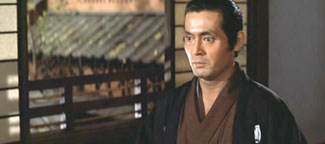 Ryoma is full of disappointment in clan politics & squabling, & feels his own opportunities as a vassal are pretty much non-existent. So he leaves Chosu for Edo, not an act that was generally permitted of a vassal. Ryoma is full of disappointment in clan politics & squabling, & feels his own opportunities as a vassal are pretty much non-existent. So he leaves Chosu for Edo, not an act that was generally permitted of a vassal.
Kinnosuke as Ryoma projects an exaggerated character. In the right film such large posturing & stagey emotionalism would be very effective, as it was in Shogun's Samurai (Yagu ichizoku no inbo, 1978), or the blindfolded decapitator scene in Cruel Tales of Bushido (Bushido zankoku monogatari, 1963). But in Bakumatsu, alongside Tatsuya Nakadai whose acting is naturalistic, Kinnosuke suffers by comparison, seeming more scene-hog than convincing character.
Having left his clan, Ryoma becomes involved in sea trade, with other Tosa men from Chosu. A memer of the group, Chojiro Kondo (Katsuo Nakamura, Kinnosuke's real-life brother), Ryoma finds a trustworthy friend, though other samurai look down on him.
Chojiro Kondo's story is a short story within the film's larger tale, & runs its course almost like a separate little movie. He was formerly a merchant & monju rice-ball maker. He became a samurai though never treated equal.
He despises that these men never fully accept him as samurai. When he gets in trouble with the shipping company, & Tosa men insist he die like a samurai, meaning he should commit seppuku. He does so, angrily, knowing full none of them could do it.
When Ryoma finds out what the others forced Kondo to do, he is livid with a combination grief & anger. Ryoma never shared the prejudice against someone like a merchant or a peasant achieving samurai status, as he thinks the social barriers between classes are wrong. And here a man he cared about is dead from just such evil.
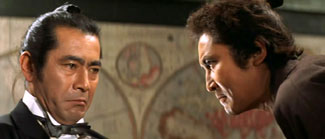 Again Kinnosuke plays it at the edge of hysteria, more spoilt child than ambitious radical for social change. Again Kinnosuke plays it at the edge of hysteria, more spoilt child than ambitious radical for social change.
Tosa men of Chosu seek an alliance with Satsuma men. If they join forces in a linked cause, they hope to bring down the Tokugawa government.
But Ryoma is rebellious even among rebels. He does not want to participate in a coup in order to change who is in charge of the shogunate. He wants the whole concept of the shogunate brought to a close. His strong difference of opinion will put him at odds with the very men with whom he had become allied.
There's also a tiny subplot which permits Toshiro Mifune to be in the cast as a guest star, though it's little more than a cameo, & he plays it like a wax figure at Madame Trousseau's. His character is Shojiro Goto, who becomes Ryoma's only half-hearted mouthpiece for advocating the shogunate return power to the Mikado.
In the machinations between advocates of the Mikado's rule vs advocates of the continuation of the shogunate, & the divisions between each camp, Ryoma tries to be a universal voice with a larger vision for Japan. But he's at the same time looking to gain something for himself, in a world without vassals but most definitely with leaders.
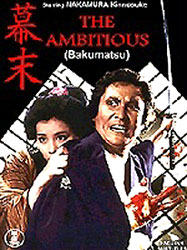 Rather than inducing trust from everyone as a mediator between camps, he'll end up trusted by no one. He will not live long enough to see those first tentative attempts at a classless society during the Meiji Restoration. Rather than inducing trust from everyone as a mediator between camps, he'll end up trusted by no one. He will not live long enough to see those first tentative attempts at a classless society during the Meiji Restoration.
Despite a dirth of action, what action there is is beautifully played. There's be a fine sequence when Ryoma is attacked by the magistrate's men. He fights first with gun, then when wounded in the right hand, hastily adapts a left-hand sword style, very impressive.
We'll also see Ryoma in the context of a brief idyll away from issues of rebellion, when he marries Oryu (Sayuri Yoshinaga); but obviously this can't last for him.
Ryoma's best friend, Nakadai's character Shintaro, has for years argued with Ryoma against his theories of utopian democracy. When the assassination of Ryoma is at hand -- a well known historical event -- Shintaro will die with him, & they share one of the hammiest death scenes ever filmed.
As our two favorite characters die, the peasants' "Eijanaika" or "Who cares!" movement can be heard as a rising chant in the distance. "Eijanaika!" indicates a non-violent uprising that would prove much more important to the end of feudalism than Ryoma could've induced had he lived. This side-bar of peasant power, greater than samurai prowess or intellectualism or government rule, is a typical bit of Daisuke Ito shining from the script.
copyright © by Paghat the Ratgirl
|
